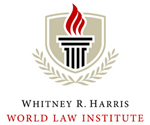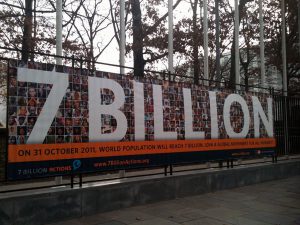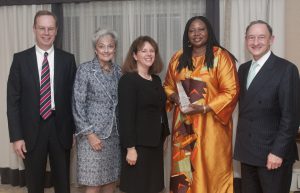Here in New York City at the 10th Session of the ICC’s Assembly of States Parties, it is remarkable how much and how little has changed since I first started attending meetings relating to the International Criminal Court and its establishment since 1995. The City seems more international than ever, and more crowded; the sign on the fence surrounding the United Nations which reads “7 Billion” perhaps explains why – there are indeed more than us than ever, it is not just an illusion. Yet the world is a more peaceful place than it was when the United Nations was founded in 1946 and the world’s population was a mere 2.5 billion or so. At least part of this success can be credited to the establishment of international institutions dedicated to, among other things, establish and maintain peace – not just as a matter of ideology but by taking practical measures to alleviate the suffering and poverty that lead to unrest, and by establishing, as Eleanor Roosevelt once wrote, a place where states can “meet and talk.” That place, of course, is the United Nations itself, and this international gathering place in this most international of cities never ceases to amaze me. Wander about the building and admire the donations from every corner of the globe of artwork, statues, carpets, figurines, glass wear and beautiful spaces, and the creativity and potential of the human spirit come alive. The ICC ASP, while not a UN institution, often holds meetings on UN premises, allowing all States to participate since all States Parties (and virtually all observers) as all States Parties are members of the United Nations and have permanent representatives in New York.
Alas, the crowding on our planet and the success of our new international institutions is reflected in the situation in the conference rooms allocated for this 10th Meeting of the ICC’s Assembly of States Parties. It is nearly unbelievable that in the short time I have been coming to meetings, the ICC has grown from a gleam in the eye of academics, experts, former Nuremberg prosecutors and a few world leaders, to an international institution with 120 States Parties as members. This has meant that the space allocated to meetings of the Court has become increasingly crowded, and the new President of the Assembly was confronted yesterday by angry delegations seated in the back of the room which had less table space and – more importantly – no access to microphones, and was forced to create a rule that each delegation was limited to only two representatives so that all States Parties could actively participate in the elections of judges in the afternoon. Since AMICC (www.amicc.org) is already reporting on the specifics of each vote, I will confine my comments to noting that with the election yesterday of a judge from the Philippines (Ms. Miriam Defensor-Santiago) and Trinidad and Tobago (Mr. Anthony Thomas Aquinas) four slots remain to be filled and 16 contenders are vying for those places, including 7 African contenders, two contenders for 1 slot reserved for Eastern Europe, 4 contenders for another slot reserved for Latin American and Caribbean contenders, a French and a British nominee. Because two of the four slots remaining must go to an Eastern European or Latin American/Caribbean nominee, the African and European nominees, as well as the other nominees from Asia-Pacific, Eastern Europe and Latin America/Caribbean it is quite likely to get very warm in overcrowded conference room 2!
A couple of other notes from yesterday’s opening plenary. First congratulations to ICC Deputy Prosecutor Fatou Bensouda for her election as Chief Prosecutor of the International Criminal Court. Her wealth of experience, her talent and commitment to justice, her tremendous personal charisma and gravitas and her inclusive and collaborative working style will no doubt all contribute to an exceptionally productive and effective tenure as Chief Prosecutor. She received the World Peace Through Law Award from the Whitney R. Harris World Law Institute at Washington University School of Law on September 20, 2011, an award established by and given in honor of the late Whitney R. Harris, former Nuremberg Prosecutor. See website. Fatou, we are so delighted with your election, and I’m sure Whitney would have been overwhelmed to hear the good news. We wish you the best of luck in your new position.
With the election of a female Chief Prosecutor, and a woman as head of the ASP, it also seems that perhaps the ICC is turning a corner in terms of gender equity at the top levels of its leadership. More later today as the Gender Report Card is launched by the Women’s initiative for Gender Justice.
A couple of other notes from the field are worth reporting. First, the United States has a large and important delegation present as observers (although they are not able to sit in overcrowded conference room 2 during plenary sessions at this point in time), and no doubt will be intervening during the general debate. The question remains why the United States continues to remain outside the ICC regime. At first the US position was that it was too complicated, premature, too difficult and wasn’t going to happen – I remember sitting on expert panels in 1995, 1996 and 1997 and hearing this over and over again. When the Statute was actually adopted in Rome in 1998, this negativity spilled over into a “no” vote, a negative report on the Treaty to the Senate Foreign Relations Committee, and much later a reluctant signature of this “flawed” treaty (in the words of the U.S. administration). The eight years of the Bush administration saw the Bolton policy of the “three nos” which were destined to help the Court “wither and die” and although this policy softened after 2006, legislation was adopted to implement it, legislation which is still on the books. Now that the ICC has 120 States Parties and is clearly doing the work that the US and other democracies want it to do – the question remains what possible benefit the United States believes it gets from remaining outside the ICC regime, unable to vote for the Prosecutor and judges, and even worse, unable to nominate one of its nationals as a judge on this important Court. Here I need to put in a plug for John Washburn, a former U.S. foreign service officer and diplomat who has served this country tirelessly for decades, whom I had the pleasure to meet at Rome, and who founded AMICC, the American Coalition for the ICC, which covers the ICC in wonderful, rich detail, and who, along with his small team of experts, continues to work for U.S. engagement with the Court and, one day, for full U.S. membership in the Court. One of the things that has remained constant during the more than 15 years I have been attending ICC-related meetings has been the steady presence of deeply committed individuals from civil society, including John, Bill Pace, head of the CICC, and Richard Dicker from Human Rights Watch. And of course, one of the individuals who has continued to be present and contribute actively to the creation and effectiveness of this new international institution is former Nuremberg Prosecutor and conscience of the world, Ben Ferencz, who at 92 years of age, continues to work for peace and the rule of law. Finally, one of the biggest issues at this ASP is the budget – a struggle for the Court, as with all the international criminal tribunals before it – to get the resources it needs to do the job it has been tasked with.



